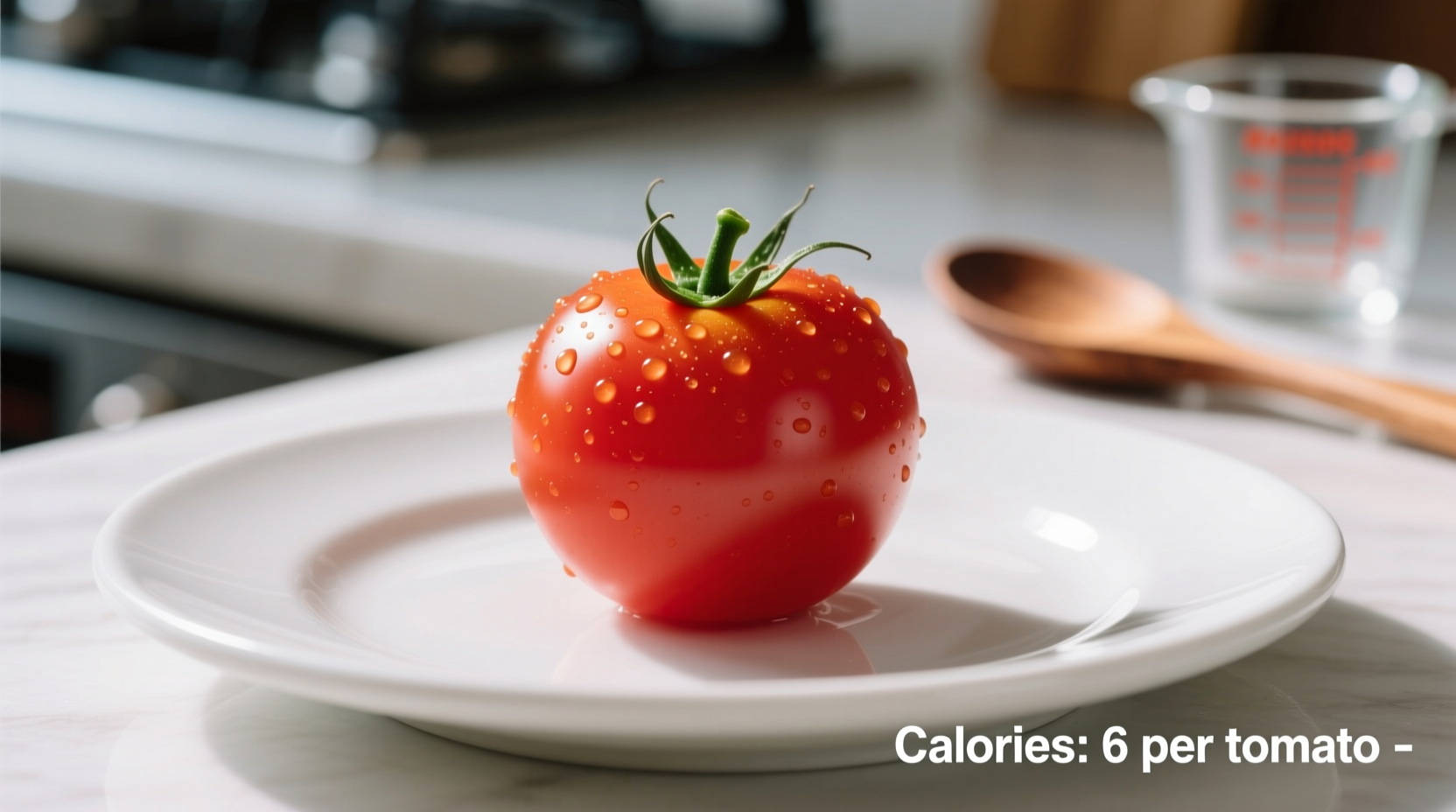Discover exactly how cherry tomatoes fit into your nutritional goals with this comprehensive guide. Whether you're tracking calories for weight management, planning balanced meals, or simply curious about this vibrant snack, you'll find precise data and practical applications that transform how you incorporate these bite-sized powerhouses into your daily routine.
Nutritional Breakdown: Cherry Tomatoes by the Numbers
Understanding the complete nutritional profile helps you maximize the health benefits of cherry tomatoes. According to the USDA FoodData Central database, here's what you get in a standard serving:
| Nutrient | Per 100g | Per Single Cherry Tomato (17g) |
|---|---|---|
| Calories | 18 kcal | 3 kcal |
| Total Carbohydrates | 3.9 g | 0.7 g |
| Dietary Fiber | 1.2 g | 0.2 g |
| Sugars | 2.5 g | 0.4 g |
| Protein | 0.9 g | 0.2 g |
| Vitamin C | 14 mg (16% DV) | 2.4 mg |
| Vitamin A | 833 IU (17% DV) | 142 IU |
| Lycopene | 2573 μg | 437 μg |
Source: USDA FoodData Central, Food Composition Database, Release 1.7.1
How Cherry Tomatoes Compare to Other Tomato Varieties
While all tomatoes share similar nutritional foundations, portion sizes and concentration of nutrients vary. Understanding these differences helps you make informed choices when tracking calories:
- Roma tomatoes: One medium Roma (62g) contains approximately 11 calories
- Beefsteak tomatoes: One slice (about 56g) contains roughly 10 calories
- Grape tomatoes: Slightly denser than cherry tomatoes, with about 4 calories per piece
- Heirloom tomatoes: Nutritional content varies by variety but generally similar to standard tomatoes
The smaller size of cherry tomatoes means you get more individual pieces per calorie, which nutritionists like those at the Harvard T.H. Chan School of Public Health note can enhance satiety through mindful eating practices.

Health Benefits Beyond Calorie Counting
Cherry tomatoes deliver remarkable nutritional value far exceeding their minimal calorie contribution. Research from the US Department of Agriculture reveals several key benefits:
Lycopene Powerhouse
Cherry tomatoes contain higher concentrations of lycopene per gram compared to larger tomato varieties. This potent antioxidant, responsible for their vibrant red color, has been associated with reduced risk of heart disease and certain cancers according to studies published in the American Journal of Clinical Nutrition.
Hydration Support
With 94.3% water content, cherry tomatoes contribute significantly to daily hydration needs. Registered dietitians often recommend them as part of hydration strategies, especially during warmer months or after physical activity.
Blood Sugar Friendly
Their low glycemic load (1 per tomato) makes cherry tomatoes an excellent choice for those managing blood sugar levels. The fiber content helps slow sugar absorption, preventing spikes that can occur with higher-sugar snacks.
Practical Applications for Daily Nutrition
Knowing the calorie count is just the beginning—here's how to leverage this information effectively:
Meal Planning Made Simple
When tracking calories for weight management, cherry tomatoes offer incredible versatility:
- Add 10 cherry tomatoes (30 calories) to salads for volume without significant calorie impact
- Enjoy 15 cherry tomatoes (45 calories) as a satisfying between-meal snack
- Use 20 cherry tomatoes (60 calories) in pasta dishes to boost flavor and nutrition
Portion Control Strategies
Nutrition counselors at the Centers for Disease Control and Prevention recommend using cherry tomatoes as a visual portion guide. Their small size makes them ideal for teaching appropriate vegetable portions, especially for children learning healthy eating habits.
Common Misconceptions Clarified
Several myths persist about cherry tomato nutrition that deserve clarification:
- Myth: Cherry tomatoes are higher in sugar than regular tomatoes
- Fact: While slightly sweeter tasting, they contain similar sugar concentrations per weight (about 2.5g per 100g)
- Myth: All cherry tomatoes have identical nutritional profiles
- Fact: Yellow and orange varieties contain more beta-carotene, while red varieties offer higher lycopene levels
- Myth: Cooking destroys all nutritional value
- Fact: Light cooking actually increases lycopene bioavailability while preserving most other nutrients
Maximizing Nutritional Benefits
To get the most from your cherry tomatoes, consider these evidence-based tips from culinary nutrition experts:
- Store at room temperature away from direct sunlight to preserve nutrient content
- Add a small amount of healthy fat (like olive oil) to increase absorption of fat-soluble vitamins
- Pair with black pepper to enhance lycopene absorption by up to 50% according to research
- Avoid refrigeration until necessary, as cold temperatures can degrade flavor compounds
Frequently Asked Questions
How many cherry tomatoes equal 100 calories?
Approximately 33 cherry tomatoes (each weighing about 17g) would total 100 calories. However, most nutrition professionals recommend focusing on overall meal balance rather than counting individual pieces, as cherry tomatoes provide valuable nutrients beyond just calories.
Are cherry tomatoes good for weight loss?
Yes, cherry tomatoes are excellent for weight management due to their extremely low calorie density (only 18 calories per 100g) and high water and fiber content. They provide volume and satisfaction with minimal calories, helping you feel full while staying within calorie goals.
Do different colored cherry tomatoes have different calorie counts?
No, the calorie content remains virtually identical across red, yellow, orange, and purple cherry tomato varieties. The primary differences lie in their phytonutrient profiles rather than caloric value.
How do cherry tomatoes compare nutritionally to regular tomatoes?
Cherry tomatoes generally contain slightly higher concentrations of certain nutrients like lycopene and vitamin C per gram compared to larger tomato varieties. However, when comparing equal weights, the nutritional profiles are quite similar, with minor variations based on specific cultivar and growing conditions.
Can I eat cherry tomatoes on a low-carb diet?
Absolutely. With only 3.9g of carbohydrates per 100g (of which 1.2g is fiber), cherry tomatoes fit comfortably within most low-carb eating plans. A typical serving of 10 cherry tomatoes contains just 0.7g net carbs, making them an excellent choice for carb-conscious diets.











 浙公网安备
33010002000092号
浙公网安备
33010002000092号 浙B2-20120091-4
浙B2-20120091-4